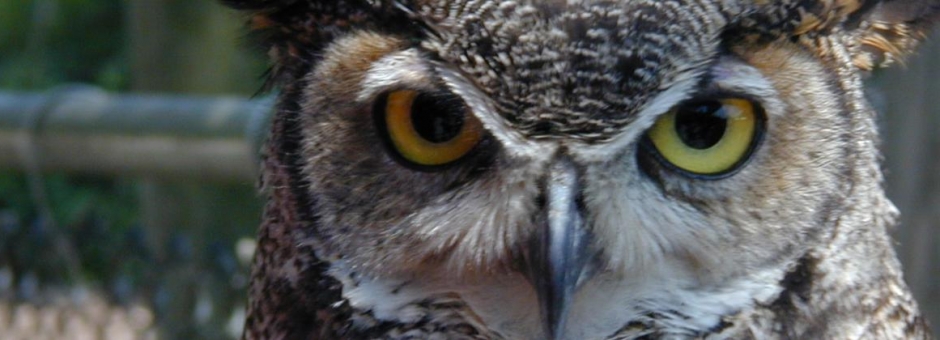Creating A Coaching Culture: Atlantis Case Study
Creating a Coaching Culture that Will Blow Away the Customers – The Atlantis Journey - 2007

Atlantis Leap of Faith
When you aspire to be the number one destination resort in the world, you had better create an experience on the property that will “blow away the customer.” For Atlantis on Paradise Island, The Bahamas, this is not an idle wish – it is the number one core value of Kezner International – the parent company and operator of resorts and luxury resorts around the world.
As a result of a successful TV advertising campaign, Atlantis is probably best known for its six story water slide down the side of a Mayan Temple which empties the slider through a clear tube surrounded by man-sized sharks – aptly called “The Leap of Faith.” Across this 600 acre property and marina, the architecture, artwork, and many of the activities available to guests of all ages are based on the fantasy of the rediscovery of the lost ancient city and civilization of Atlantis. Among its sources of eye candy are giant Dale Chihuly glass sculptures, multiple lagoons (including one where you can swim with dolphins), an archeological dig containing Atlantian artifacts, and a collection of exhibits which form the world’s largest open air aquarium - complete with giant manta ray and 15 foot hammerhead sharks.
But to achieve and sustain the status of a world class destination resort, unique architecture and a distinguishing physical environment are not enough. Atlantis must meet or exceed the service standards of such industry benchmarks as Disney, The Four Seasons, and The Ritz Carlton. The luxury Kerzner One and Only Clubs must meet the service expectations of such frequent guests as Oprah Winfrey, Michael Jordan, and Bill Gates. The unique atmosphere and eye candy may attract guests for the first visit, but it will be the service that will keep them coming back.
Pursuing Service Excellence While Expanding Rapidly

Atlantis Phase II
As if pursuing these standards were not enough, Atlantis and Kerzner International are growing at a rapid pace. In 1994, Sol Kerzner acquired the 1,150-room Paradise Island Resort in The Bahamas, which had fallen into bankruptcy. He launched a four year major redevelopment and expansion program which turned the renamed Atlantis, Paradise Island into a 2,300 room resort and casino. The resort has been so successful, that Kerzner has invested more than $2.0 billion USD into expanding Atlantis Bahamas to almost 3,000 rooms. This massive water-world resort opened in December, 1998, at which time Atlantis had become the Bahamas' second-largest employer, after the Bahamian government itself.
Additional expansion since 1998 has included: a 65,000-square-foot marina-based shopping and dining village featuring 21 retail shops, and five distinct restaurants; vacation ownership luxury villas; a spa; a children's learning center; a golf course; a comedy club; convention facilities; and a movie theater. As of 2006, the property had a total of over 35 restaurants, bars and lounges.

Atlantis Phase III circa 2007
The completion of Atlantis' Phase III development in early 2007 represents a billion dollar expansion to the existing Atlantis property. New amenities include The Cove Atlantis - a 600-room, luxury all-suite hotel with interiors designed by Jeffery Beers and David Rockwell; and an adjoining 495-unit condo-hotel. Aquaventure, a new 63 acre waterscape, includes a 120 foot tall Power Tower with four adrenaline-inducing waterslides, where the guests never have to leave the water and climb back to the start because they are propelled back up the slide tower via water conveyers. Dolphin Cay, the dolphin interaction and education center and the Bahamas’ first rescue and rehabilitation facility for dolphins, features 17 dolphins displaced by Hurricane Katrina. The Cove also features Bobby Flay’s first Mesa Grill outside of the U.S., private all-adult and family pools, concierge-level suites, 22 private ocean facing cabanas, a 30,000 square foot Mandara Spa, The Intimate Night Club, an additional gaming area, and additional luxury retail shopping.
An Interview with Beverly Saunders, V.P. OD and Training for Atlantis

Beverly Saunders
The following is an interview conducted in 2006 with Beverly Saunders, Vice President – Organization Development & Training for Kerzner International Ltd., Atlantis, Paradise Island, Nassau, Bahamas. The interview was conducted by Dr. Gary Myszkowski (aka, “Doctor G”), who served as the engagement manager and base trainer for the Effective Coaching Workshops delivered to Atlantis by Lore International Institute. The interview was intended to capture the journey Atlantis HR was on in creating and developing a coaching culture over a period of several years, culminating in the "Effective Coaching" workshop and follow up interventions for all executives, managers, and supervisors at Atlantis.
Doctor G: Beverly, how did this journey to developing a coaching culture at Atlantis begin?
Beverly: Karen Carey (Senior Vice President, Human Resources, Atlantis, Bahamas) and I started the Atlantis University in 2001 with the goals of creating a curriculum that would support the operators at Atlantis and improve specific operational issues. While our employees had been trained in the skills and procedures for their specific jobs, we knew that task skill training alone would not be enough to result in our guests having a distinctive service experience – one where we would ‘blow away our guests.’ For the first four years of this journey, we contracted with consultants to put together a curriculum to try to accomplish this.
Doctor G: What needs were you trying to address through this training and education curriculum?
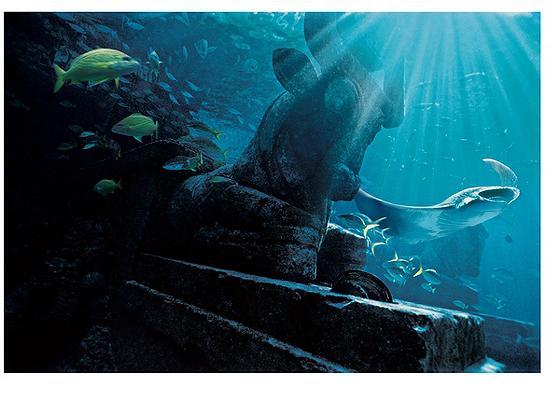
Atlantis Manta Ray
Beverly: We took a hard look at ourselves and realized that there were some aspects of our company culture - about how we supervised and managed our employees - that were going to be a barrier to us moving forward and achieving our service and guest experience goals. For whatever reason, shared expectations had emerged over time among employees, supervisors, and managers about what was rewarded and what was successful performance. We were forced to face the harsh reality of admitting what we did not know and set ourselves up to benchmark the best practices used at other successful companies and decided what would work in our organization.
We realized from our Employee Satisfaction Survey that employees wanted more opportunity for development and that many of our managers and supervisors did not know how to effectively mentor and coach employees while offering support for each employee’s personal development. Many of our managers seemed to be operating from the assumption that he or she was solely responsible for the results of their area without the effort of the team working towards agreed upon goals. Based on these assumptions, too many of our managers were imposing themselves on our employees, becoming task masters, and essentially not treating them with respect. We saw more and more instances where supervisors were ‘writing people up’ (a second level of disciplinary action) and focusing on catching people doing things wrong. The employees felt there was too much conflict with their respective managers.
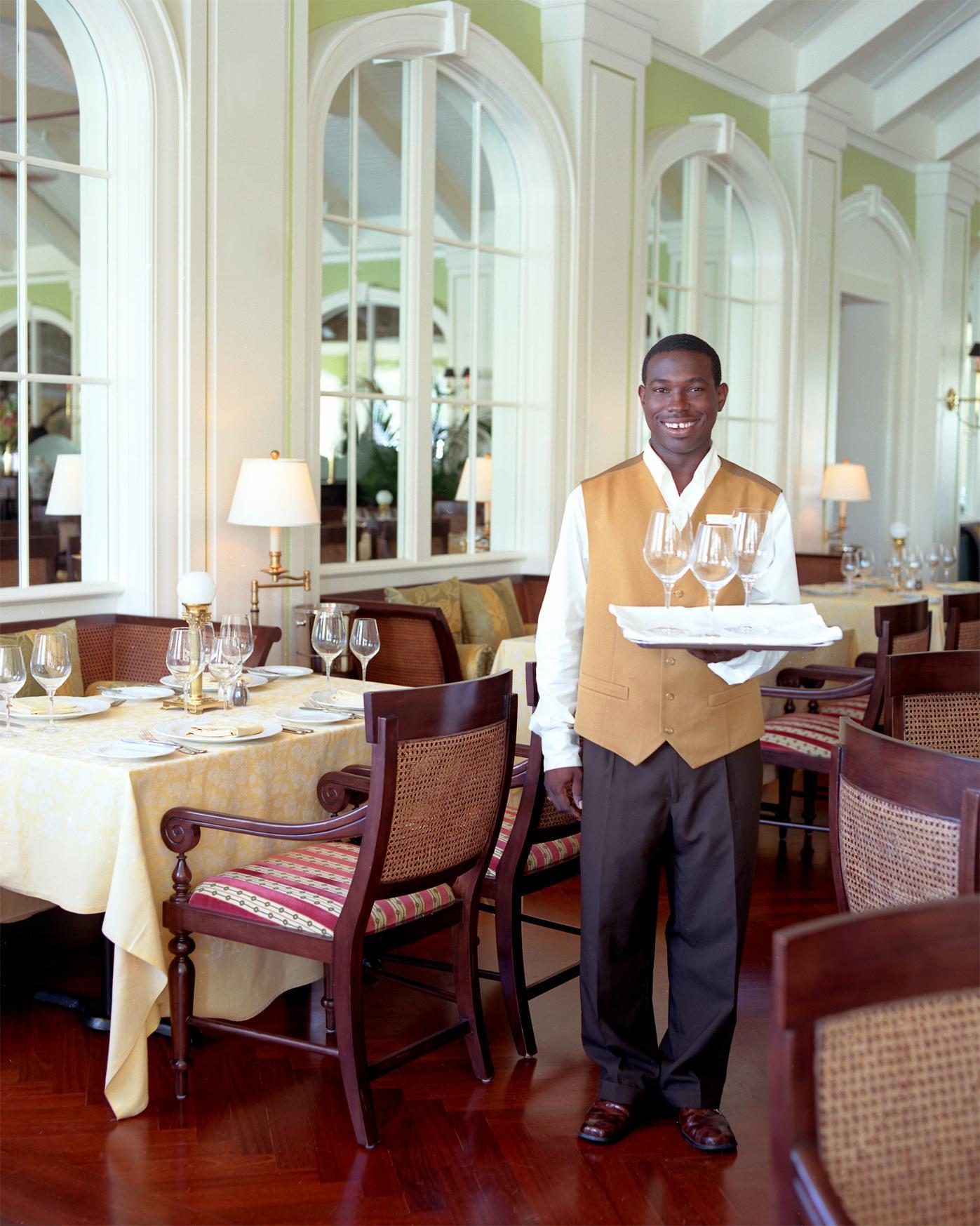
Cafe Martinique Atlantis
So we began to assess our current situation more systematically. We carefully reviewed the results of our Employee Satisfaction Survey Index (ESI) that came out a twice a year. We listened to the feedback from our customers on the service and their experiences with our employees. We did a lot of focus group sessions. We also did a SWOT (Strength, Weaknesses, Opportunities, and Threats) analysis to guide the kinds of changes we needed to make at the One and Only Club.
We also begin to look externally to benchmark other examples of world class standards of service in our industry. We conducted benchmark visits with other successful companies in the hospitality industry and in other industries to learn how they selected and developed their employees to achieve the enviable reputations that they enjoy with their customers.
As we learned, we felt it was important for managers to see that they were not solely responsible for the results of their area. We took the position that each manager or supervisor could better support our business goals for guest experience and profitability if they effectively mobilized their team and managed their talent. We also wanted them to spend more time catching people ‘doing things right’ and inspiring them to ‘go the extra mile.’
A second important driver for the curriculum was the Kerzner growth plan for Atlantis’ near future. One of the major concerns of our owners was making sure that we had the leadership talent pool in place to keep pace with our aggressive growth. Having the talent and leadership in place to enable the growth plan quickly became recognized by us and top management as a critical success factor.
Doctor G: How much growth was planned and what were the talent management implications?
Beverly: The Kerzners acquired the bankrupt properties that formed the foundation of the current Atlantis in 1994 and over the next four years essentially rebuilt them. This was Phase I of the development. In 1998, we completed Phase II with the opening of the 1,200-room Royal Towers and a 50,000-square-foot casino. We grew from about 2,500 employees to about 5000. In 2006 and 2007 as we opened Phase III, we grew from approximately 6,500 employees to almost 9,000. And, we hope to use our talent base in the Bahamas to serve as a feeder to other emerging Kerzner developments, such as Atlantis, The Palm, Dubai and a number of One & Only Resorts around the world.
We need to integrate all of these new employees and managers, meet or exceed our service standards, and grow our talent as quickly and as effectively as we can. There is no other option.
Doctor G: How did you come to focus on developing coaching skills as key part of that curriculum to address those needs?
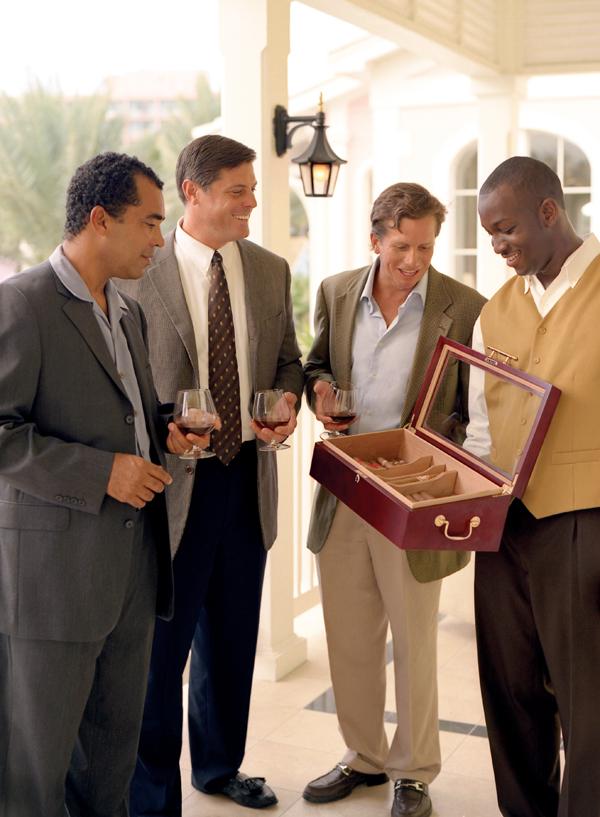
cognac and cigars
Beverly: From the beginning, we knew that coaching was critical to our mangers’ and employees’ success. We knew from other service businesses that the everyday behaviors and actions of satisfied, engaged, and motivated employees immediately translated into guest satisfaction, which translates in our business into higher occupancy rates, more return visits by our guests, and ultimately higher profitability.
But as we began this journey we found that we needed to put a foundation in place before we could successfully introduce coaching as a desired part of our culture. Our first attempt at delivering training in coaching skills (prior to engaging Lore) addressed some of our concerns about improving operations, processes and how our employees were being led. But when we evaluated the results of the initial training program in coaching, we were disappointed. Some people ‘got it’ and some people didn’t. Some people treated the training as “nice to know.” They could clearly see that others needed the training, but they did not always see why they needed it. The transfer of coaching skills into the expected way of conducting day-to-day business was very much hit-or-miss. We concluded that there were a number of other spokes in the wheel that we needed to put into place first before coaching would catch on and “take.”
Doctor G: What were some of these other spokes?
Beverly: First the senior management team needed to buy into the need and drive the coaching. We met with them individually and as a group and discovered that there was not a lot of talent management occurring in a systematic way. People were more focused on their short term outcome numbers than what we were doing to develop our people over time. If it was not happening at that level, why would we expect it to be happening anywhere else? The leadership team quickly recognized this and decided that development and talent management was a critical success factor for our growth - and it needed to start with them. Our mission and values statement states that we are a learning organization and a caring organization.
When Paul O’Neil came to Atlantis as the President/Managing Director of Kerzner International Bahamas, he recognized the need to aggressively develop our people. Paul knew that Atlantis University would be one of the major vehicles we could use to bring about strategic alignment among the senior leadership team as well as train managers in behaviors that would create the culture of learning he so desired.
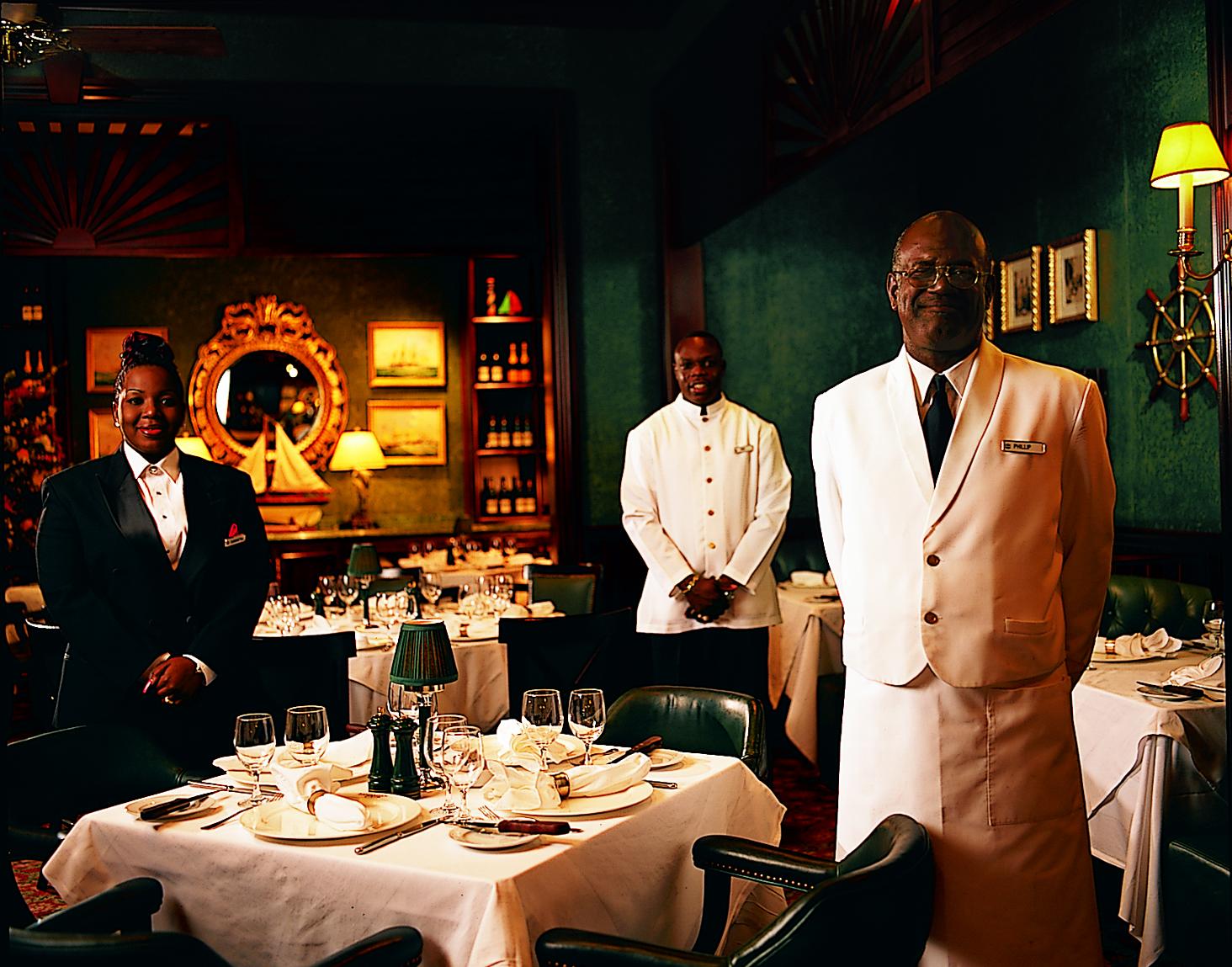
Bahamian Club
We also tied accountability to improving our employee (ESI) and guest satisfaction surveys index results (GSI) and other performance indicators. Where low scores or gaps were identified, managers now needed to have action plans in place and show progress in implementing them as well as show measurable improvement in their personal and departmental performance. We incentivized specific improvements - tied it to performance and their pay.
We designed and implemented a 360° feedback survey process for all of our managers and supervisors. The results typically showed that they had developmental needs as managers. Combined with the ESI and GSI results, the need for continued development for many of these managers was now undeniable.
We also revised our leadership competency model and our performance planning and appraisal system to include a requirement for coaching. If you don’t measure and reward behavior, it will not change.
And perhaps the other key spoke in the wheel was an emerging process where we began to identify our talent pool – people we thought had the potential to grow, develop, and advance within Atlantis, and eventually Kerzner International itself. We started to identify our star employees and began to formally connect them with designated “Mentors.’ Now, with Phase III almost complete, we are beginning to identify our ‘A’ players. We intend to begin with 12 to 20 employees – starting with Atlantis in the Bahamas. This would be a fast-track approach to developing a small group of our very best talent. Their development would include involvement in stretch projects and assignments and maybe even relocating to other Kezner properties, internationally, to get exposure to all facets of the business. This will be a very visible program so others will want to aspire to become part of it.
Doctor G: Where did ‘effective coaching’ fit in as these spokes were assembled and implemented?
Beverly: Once we had many of the other spokes in place, it became apparent to some managers and supervisors that they did not know how to develop their people and meet Atlantis’ expectations, despite their best efforts.
Lore’s Effective Coaching Process and Workshop filled a critical spoke in the wheel. As we learned more about it, we realized that it gave us a common language about how to develop people every day. It defined what ‘coaching’ really meant. It had practical, relevant principles that people could immediately apply. As we rolled it out, we could see that it built the confidence of leaders who were really struggling. It helped some managers succeed for the first time in reaching and energizing an employee who was underperforming. It was immediately apparent that it was also part of our mentoring process.
DoctorG: How did you begin implementing the ‘effective coaching’ spoke once you decided the foundation was in place?
Winning
Beverly: During this whole period, we continued to search the world for the best consulting and training firms we could find who could quickly help us design and implement these spokes.
As part of this search, Karen and I attended a Conference Board session in Atlanta where we heard Barbara Singer of Lore speak – and we liked what she had to say about coaching and how coaching skills had been developed in other companies. Then we spoke more extensively with you about how the program might be customized to our unique situation. We read Lore’s White Papers, including ‘The Case for Executive Coaching.’ We also read Lore’s book on Adaptive Coaching by Terry Bacon and Karen Spear.
Once we had confidence that this workshop was worth pursuing, we contacted previous Lore clients who had engaged Lore for similar projects. We talked with Raytheon and Cisco Systems, both of whom found Lore to be extremely collaborative and top notch in terms of customization and the faculty delivering the workshops.

Nan Palmer Endorsement
As a next step, Karen and I asked Lore to design and deliver a pilot program for a cross section of representatives of our operations at the leadership level. Both the Workshop and the Lore representatives were accepted by our managers. And the customization that would be necessary, largely in the role plays, seemed doable. Now the question was: “how could we bring this to the leadership of Atlantis and get their buy-in?” We knew we could not get their undivided attention for the full two days of the typical workshop.
Lore designed and delivered a one day executive version of the workshop. It was a balance of conceptually coming to understand the several essential principles of effective coaching taught during the workshop with opportunities to try their own hands at role playing the modeled process. They liked how practical it was and how much it focused on coaching skill development before the workshop was completed. We got their buy in! Later, many of them returned to attend the full two day workshop.
Doctor G: When you had the approval and support of the top management team, how did you begin to roll out the training to this large population of executives, managers, and supervisors?
Beverly: Fresh from our success with the senior executive group, we used that momentum to ask our division heads to recommend some of their managers who were both likely ‘early adopters’ as well as opinion leaders. In the spring of 2005 we trained approximately 100 managers. Our early roll-out workshops were purposely composed mostly of managers from similar levels of the organization, assuming they would share similar supervisory problems, challenges, and concerns. People in the workshops quickly saw that there was a better way to manage. Many recognized that they were unintentionally not allowing their employees to be part of the solution by how they were supervising them. It was one of the strongest “ah ha’s” early in the workshop that got everyone’s attention.
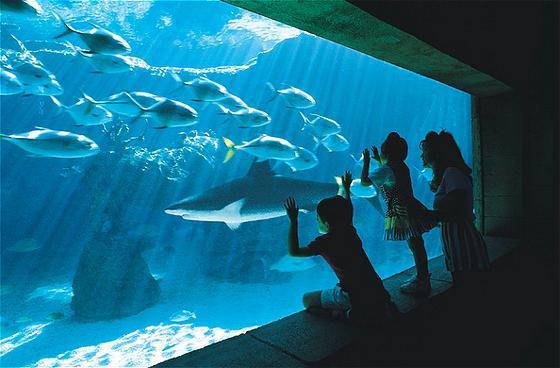
Viewing the Aquarium
Even the skills taught on the first of the two days in the workshop were so clear and useful that many students went out and tried some of them the evening after the first day. They tried them with their employees, their spouses, their adolescent kids, and in one case, with her minister. Managers came back with success stories and testimonials the second day of how their first attempts at following this process and using these skills had gotten them better results. Over the next year, with the many workshops we delivered, this became a common occurrence. Word spread quickly that this was a great program and you would learn a lot of valuable skills.
Given all the previous foundation work we had done and the other spokes of the wheel that were in place, the timing was perfect. We were very excited about the reception the workshop was getting from the participants and the results we were beginning to see.
We looked at the workshop evaluations completed at the end of each day of the workshop and we also individually followed up with participants and their bosses back on the job. The results were so positive that we decided to continue with the roll-out. With Phase III breathing down our necks, we had about another 200 supervisors, managers, and executives who would need to be trained if we were to begin to make this part of our culture before a massive influx of new employees would drive our attention back to basic orientation and skill training.
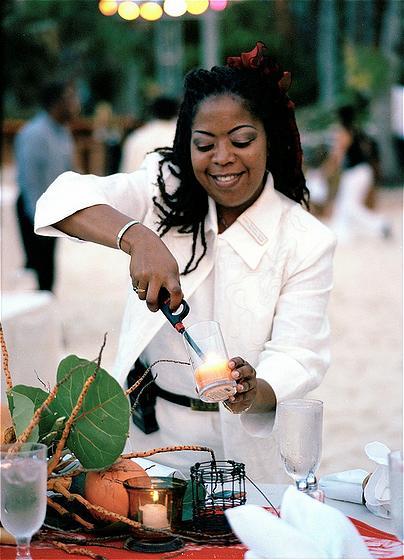
Preparing an Outdoor Reception
So, starting with the pilot workshop in December 2004, we trained approximately 300 executives, managers, and supervisors in the Effective Coaching process and skills over the next eleven months. There were about twenty two-day workshop sessions delivered over that time period.
Doctor G: When it became clear that Atlantis was committed to this major initiative, what else did you do to support the training and institutionalize coaching as part of how Atlantis did business?
Beverly: We realized pretty quickly that we needed an internal infrastructure or support system to help managers and supervisors as they tried to apply and master these new skills, especially with some of the more difficult employees or employee situations.
We came up with the idea of developing “Super Coaches” – sort of master coaches who could serve as behind-the-scenes ‘coaches for the coaches.’ The staff at the Atlantis University was already close to being overwhelmed with training demands and Phase III would totally tax all of our resources. By tapping into executives, managers, and supervisors to take on this role in addition to their ‘day jobs,’ we leveraged our in-house expertise. This also helped to position this initiative as a line-owned initiative vs. an HR-driven program.
We positioned the Super Coaches as people who were not their bosses, were not out to steal their jobs, who understood the value of coaching and did not see it as a burden, and who genuinely wanted to see the other supervisor or manager be successful – to help them achieve their own success.
Doctor G: How did you select and develop the Super Coaches?
Beverly: We asked the expert faculty at Lore to identify students in the workshops who seemed to learn and use the process easily and effectively. We then compared that list over time with what we thought we knew about these people and picked out people we were confident would be accepted as leaders and role models within the Atlantis employee and management community. Then we asked Lore to design and deliver a customized Advanced Coaching Skills Workshop to train these twelve Super Coaches in advanced skills.
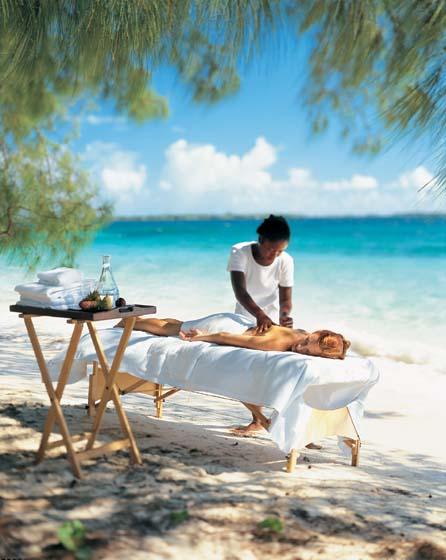
Private beach massage
Doctor G: Were there other things you did to support the results of the training?
Beverly: There was an immediate follow up ‘back on the job’ assignment for each of the students. First they had to go back and discuss what they had learned with their boss – who had probably already attended the workshop. We had specific assignments for students to take the initiative and apply their coaching skills to three or four individuals at least over the next six months, with follow up from us and their boss.
Lore also provided us with a Coaching Effectiveness Survey which each supervisor or manager could give to each person they coached, and after a specific time, the coach would receive a confidential report of the combined results of three or more coachees and their ratings of how effective the coach was at each of the different parts of the Lore coaching process. The confidentiality of the coachees was preserved and the report was not shown to the coach’s boss – unless they chose to – it was purely for their continued development as a coach.
Then, as the ultimate safety net, we asked you, Gary, to serve as our external expert executive coaching resource to be available for consulting with us on coaching problems that escalated from a coach to either a Super Coach or faculty from Atlantis University, and where we felt we all needed some additional wisdom and perspective to solve the problem. In other words, you are the ‘coach to the Super Coaches.’
We are now in the process of working with Lore to design and deliver a refresher course on Effective Coaching into our continuing curriculum at Atlantis University. We are also working with Lore to develop our in-house capability to deliver the two day Effective Coaching Workshop, so we can have a cost-effective means for training our new supervisors, managers, and executives who were brought on board as part of the Phase III expansion.
And finally, keep in mind, as I mentioned earlier, that coaching was already incorporated as a performance expectation in our performance planning and appraisal process.

baccarat table
Doctor G: You mentioned earlier that there were key principles and “ah ha’s’ that your managers experienced in the workshop that allowed them to supervise their people differently. Which of those seemed most important?
Beverly: I think the first ‘ah ha’ for the participants was that different people prefer to be coached using different styles. It is not ‘one size fits all.’ The workshop gave us a framework to define what those different styles were and how to adapt our styles of coaching to the coachee.
Second, ‘getting the monkey off your back’ and, as a manager, not having the employee’s problems thrust onto your shoulders. The workshop showed us that we were spending too much time in our own heads and trying to solve the problems for our employees. The workshop gave us the framework, tools, and skills to engage our employees to think about what was the cause of the problem, the alternatives to solving the problem, and using the employees’ experience and intimate knowledge of their roles to come up with solutions that worked and they were committed to. We got the monkey off of our backs.
And finally, I think the biggest ‘ah ha’ for most of us was realizing that we were often addressing the presenting problem that our employees were bringing to us and trying to solve that problem, rather than taking the time to discover what the underlying problem was and helping the employee find a solution. It was like repeatedly treating a fever and not the underlying infection. It reminded us that ‘Give a man a fish and you feed him for a day. Teach a man to fish and you feed him for a lifetime.’ By helping the employee use their minds and problem solving skills, they became less dependent on the supervisor.
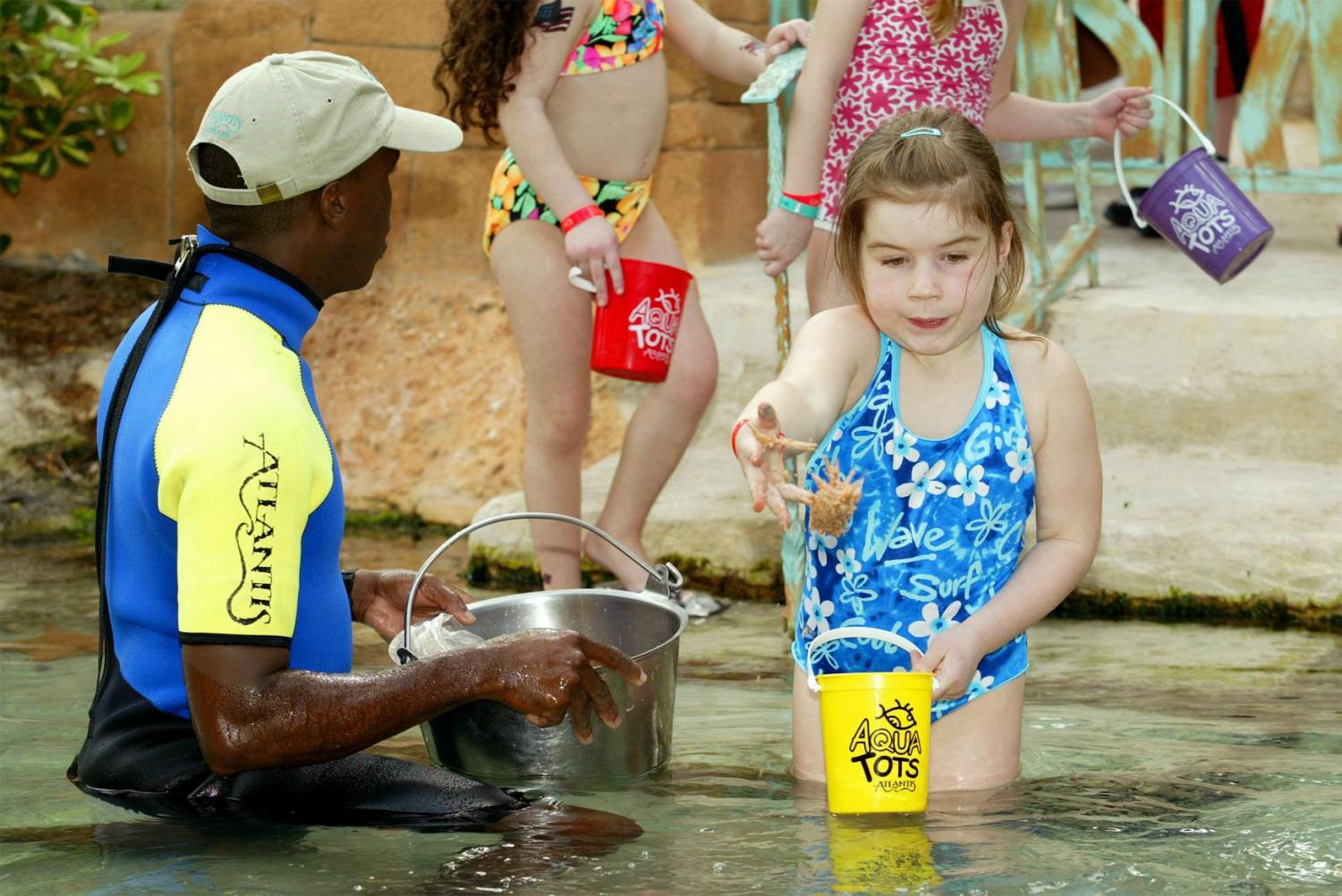
Kids Feeding Fish
Doctor G: How have you evaluated the effectiveness of the training so far?
Beverly: I personally looked at every evaluation completed anonymously by the workshop participants at the end of the first day and at the overall evaluation of the program and the workshop faculty at the end of the second day of each workshop. Lore also compiled a report of the evaluations including people’s anonymous comments. The ratings of the program and the faculty were among the highest we have ever had. There were no complaints about having to attend the training – remember it was mandatory. There was no negative feedback at all.
Next, we looked for evidence that the coaching behaviors were actually being applied back on the job. There were plenty of anecdotes of managers feeling more self-confident about using the coaching to get their employees to think and solve more of their problems. At the same time, they saw their ESIs start going up. It did not take long before we had some emerging wins. For example, Ian, our SVP of Food and Beverage, found that his ESI (Employee Satisfaction Index) jumped three points shortly after a critical mass of his managers and supervisors completed the training.
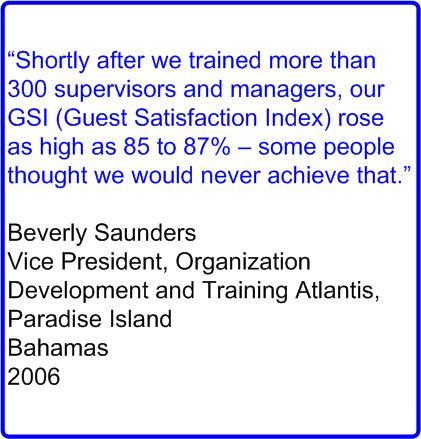
Guest Satisfaction Peaks
But perhaps more importantly, we had significant improvements in our GSI (Guest Satisfaction Index). Early in this journey, our GSI typically hovered around the high 60s and low 70s. Shortly after we trained more than 300 supervisors and managers, our GSI rose as high as 85 to 87% – some people thought we would never achieve that.
Doctor G: From your perspective, what have been some of the most valuable outcomes or results from the training that we have not already discussed?
Beverly: In terms of Atlantis, I think this will be part of a larger cultural change where we have more employees with the self confidence to perform. People will not avoid things they might think they are not good at or sure of. People are beginning to show the self confidence to stand up and recognize that they don’t know everything. They will see these gaps as an opportunity to learn. Eventually, many more employees will begin to take more ownership of their businesses instead seeing this simply as a job. They will begin to take more calculated risks. Employees will step beyond procedures to provide exemplary guest service experiences. The employees will not be afraid to experiment and possibly fail.
We are clearly beginning to engage the minds of the employees. And if we do that, the hearts follow quickly behind. In the past, in our culture, ‘thinking time’ was considered to be ‘goofing off.’ Now, increasingly, a thinking employee who recognizes or anticipates a guest need beyond the employee’s immediate tasks and duties and then provides service to that guest – that employee behavior distinguishes us from the competition.
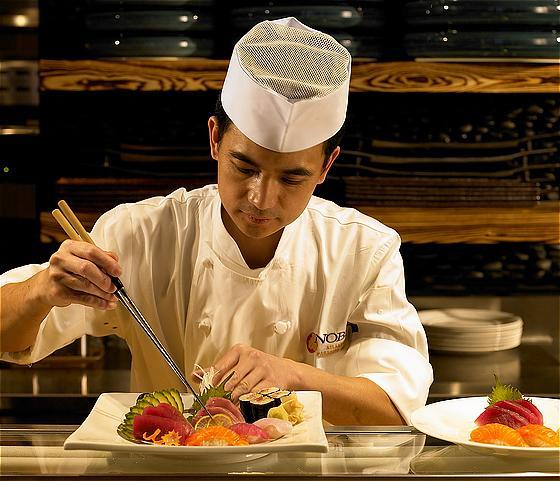
Nobu Chef Station
Another benefit is that the effective coaching process leverages all of our managers and supervisors to develop our talent pool on a daily basis. Development no longer occurs a couple of times a year when it is delivered by HR in training courses. Managers now see developing their people for the current job and future jobs within Atlantis as part of their day job. The cultural change has begun and people are less reluctant to offer up their best people for advancement.
All of this benefits the local Bahamian community – and that is so important. The more successful Atlantis becomes, the more opportunities there will be for our employees to advance and take on responsibilities they could barely imagine a few short years ago.
Atlantis has become the benchmark for the Bahamas and much of the Caribbean. Any Bahamian will tell you that if you want the best training and the best in leadership development in the Bahamas, you have to go to Atlantis. We have gone to the international market to find the best practices and the best consultants to help us build those best practices in a way that works for us.
There are a lot of companies in the Bahamas and the Caribbean that are interested in what we are doing in the Atlantis University. They may not have the way to build these training capabilities in-house for themselves. We are increasingly offering training to these other companies.
We have been fortunate to have a top management team that recognizes that if you want the business to do ‘this,’ then the culture has to do ‘this.’ And there has to be a thoughtful plan that is refined as you learn what works and what doesn’t in your situation. All the things that need to occur outside of the training and the training itself needs to be funded by the organization. And top management needs to model what they want their mangers to do – they need to ‘walk the talk.’ There are no quick fixes and this is hard for some leaders of other companies to realize or accept. We have been very fortunate.
Doctor G: What advice or ‘point outs’ would you give to others who are beginning a similar journey?
Beverly: First of all you have to realize that attempting culture change is not a destination – it is a journey. There are no quick fixes and we had to continually test what would work at Atlantis. Everybody is different. Be prepared to go down some dead ends. We are still on that journey and we don’t expect that coaching will really be completely institutionalized in our culture for at least three to five years from now, at the earliest.
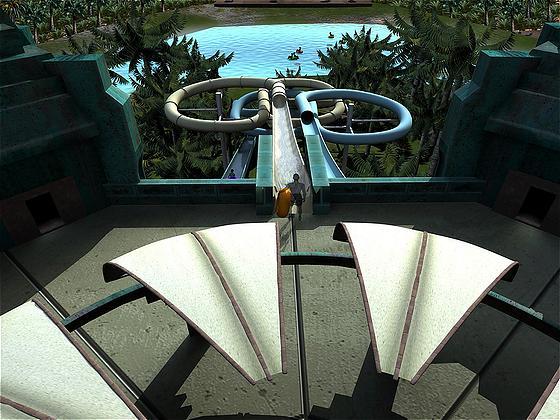
Power Tower
Second, the OD consultants at AU had to build an effective partnership with our internal customers and clients. We needed to demonstrate that we understood what the business needs were. Then we presented to the senior executives what their options were to meet those needs and discussed with them on the pros and cons and implications of different courses of action. And very importantly, we were committed to measuring impact and results as much as the operators were. And finally, we had accountability to work with them in partnership to make it work. Senior management ownership and commitment to the culture change, the Atlantis University curriculum, and this workshop in particular, were critical.
The third point is that we had to create a foundation which allowed our managers and supervisors to be ready to accept and adopt the training. There were a number of things we did to increase their readiness to engage in this learning.
And finally, once we had concluded that the training would create business value for us, we had to be willing to make the investment and budget enough money. This was not inexpensive. But the investment was worth it. Don’t try to do this ‘on the cheap.’
A lot of thought and careful consideration guided us on this journey. Unlike our famous water slide, this was not a ‘leap of faith.’

Beverly Saunders
Beverly Saunders is the Vice President, Organization Development and Training for Atlantis, Paradise Island. Bahamas. Beverly had extensive experience in training and organization development in the U.S. before joining Atlantis.
Beverly can be reached at:
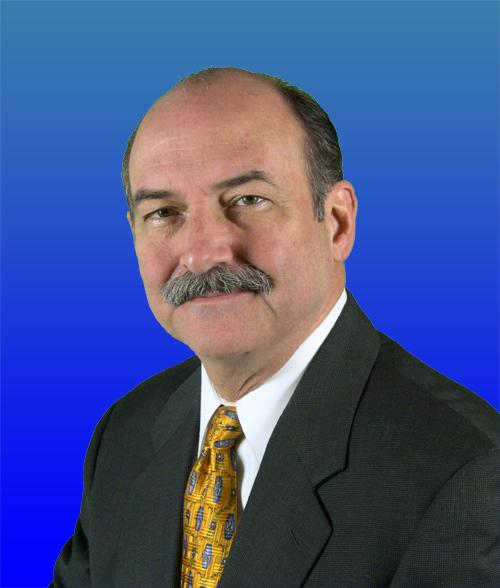
Dr G
Dr. Gary Myszkowski is a Lore Certified Independent Executive Coach and a Business Development and Engagement Director for Lore with over twenty years of experience. He served as the base trainer for all of the Atlantis Effective Coaching Workshops in partnership with other senior Lore faculty and executive coaches.
“Doctor G’ is based in Chicago. He can be reached at
847 / 420-2420 or at
Coaching Skills Workshop Profiles
The Effective Coaching Workshop is an intensive two-day workshop where participants learn the skills to apply the four step coaching process. It is typically customized to the culture and common realities facing a client’s managers and supervisors. Through a low faculty-to-student ratio and multiple opportunities for guided role play, students practice how to coach their direct reports and others. These skills can be applied immediately upon completion of the workshop.
The Advanced Coaching Workshop is a highly participative three-day program intended for in-house coaches and OD consultants. It is customized to the current capabilities of those coaching resources and addresses the more complex and difficult issues that can arise in coaching such as: evaluating coachability, working with coachee defenses, helping coachees who are stuck in the change process, coaching coaches, giving tough feedback, controlling your own preferences and biases, and determining when coaching is not appropriate.
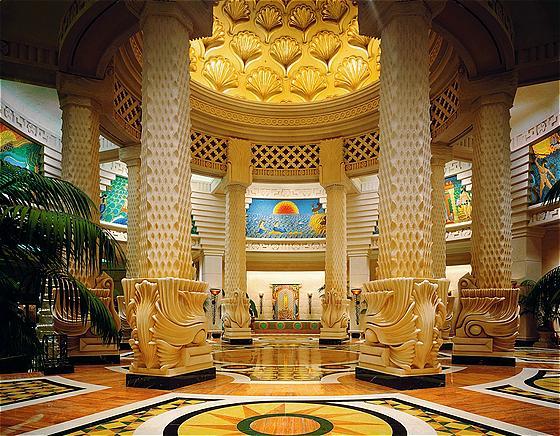
Royal Towers Reception
About Kerzner International - 2007

Cove
The Company is extending its Atlantis brand globally with the development of Atlantis, The Palm, Dubai, an approximately 1,500-room, water-themed resort expected to open in late 2008, currently being constructed on The Palm, Jumeirah, a multi-billion dollar leisure and residential development in Dubai. In its luxury resort hotel business, the Company manages ten resort hotels primarily under the One&Only brand. The resorts, featuring some of the top-rated properties in the world, are located in The Bahamas, Mexico, Mauritius, the Maldives and Dubai. An additional One&Only property is currently in the planning stages in South Africa. For more information concerning the Company and its operating subsidiaries, visit www. kerzner.com.
### End of Atlantis Case Study ###
Copyright © Wiznami Corp. 2023. All rights reserved.
Wiznami Corp. is an a senior executive coaching service based in Naples, Florida.
